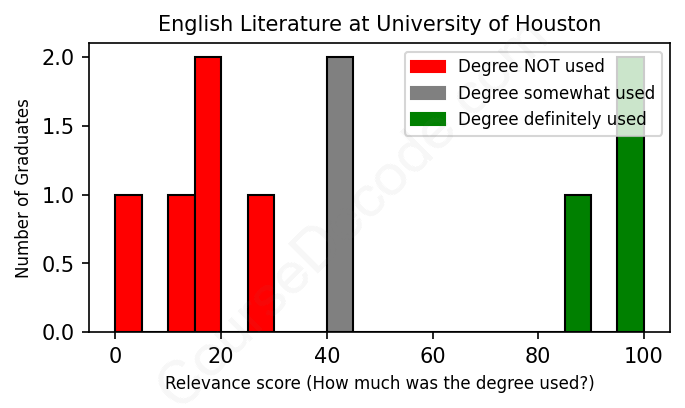
First, some facts. Of the English Literature graduates from University of Houston we've analyzed , here's how many have used (or NOT used) their degree in their career:

These are estimates based on AI analysis of 10 LinkedIn profiles (see below).
The verdict? Bad. Overall, with an average relevance score of 43%, English Literature graduates from University of Houston have a substantially lower likelihood (-24%) of finding work in this field compared to the average graduate across all fields:
And for comparison, here's the chart for all profiles we've looked at across all degrees.
Also, after graduating, only 30% of these graduates have pursued further education other than another Bachelor's degree (such as a Masters degree or other), compared to the average across all profiles of 35%. This suggests a Bachelors degree is enough for most English Literature graduates, and it's normal to look for work straight after graduation.
See the details:
|
Relevance score: 11% We think this person has NOT gone into a career related to their degree. We think this person has NOT gone into a career related to their degree.
DEGREE INFOGraduated in 2017 from University of Houston with a Bachelor's degree in English Literature. No other secondary education since. JOB HISTORY SINCE GRADUATIONGeek Squad Consultation Agent Best Buy Sep 2019 - Jun 2021 Senior Consultation Agent  Best Buy Jun 2021 - Feb 2022 Retail Sales Supervisor  Best Buy Feb 2022 - Jun 2023 Technical Support Specialist  AvidXchange, Inc. Jun 2023 - Sep 2023 Client Support Analyst II  Williams Sep 2023 - Present ABOUTExperienced Salesperson with a demonstrated history of working in the retail industry. Skilled in Customer Service, Retail, Microsoft Office and Social Media. Strong sales professional with a English, B.A. focused in English Language and Literature, General from University of Houston. |
The top 10 most common jobs done by the graduates we've analyzed (ranked most common to least) are:
From the job data you’ve provided, it looks like most graduates with a degree in English Literature from the University of Houston have gone on to have a diverse range of careers, but not all of them are directly related to their studies. Many have taken on roles in education, like teaching or administrative positions in schools, which definitely draw on their English Literature background. Jobs like English Teacher or Team Lead for English are prime examples where their literature knowledge is put to good use. But then there are a lot of other positions that don't seem to connect much with English at all, like cashiers, customer service reps, and even roles in hospitality or management that mostly rely on interpersonal skills instead of literary analysis or writing. It’s a mixed bag for sure.
Overall, while some graduates have found paths that heavily incorporate their English Literature training—especially in writing and education—many have ended up in jobs where that background isn’t as crucial. Positions in the legal field, like an Associate Attorney or Legal Assistant, do seem to benefit from the skills honed in an English Literature program, particularly in writing and critical thinking. However, it seems the reality is that a lot of these job seekers have needed to adapt their degrees to fit into broader job markets, and not every job reflects a direct relevance to literature. So, while an English Literature degree gives a strong foundation in communication and analytical thinking, the application in the workforce can vary widely!
Here is a visual representation of the most common words in job titles for English Literature graduates (this is across all English Literature graduates we've analyzed, not just those who went to University of Houston):

When you look at the career paths of University of Houston English Literature graduates, it seems like there's a pretty mixed bag going on. Right after graduating, many people seem to dip their toes into various fields, often taking jobs that aren’t directly related to English Literature. For instance, some started as customer service reps or in administrative roles, which isn't exactly what you might think an English major would jump into. However, it does show that they’re willing to tackle different opportunities, probably to gain experience or just to pay the bills.
Fast forward five to ten years, and you start to see a bit more alignment with their degrees. Some grads eventually found their way into teaching, editing, and even roles in law or philanthropy, which are more closely related to skills developed during their studies. However, there are also those who stuck around in jobs that feel disconnected from what they studied, like working in retail or management roles in non-literature-related industries. So, while some journeyed into satisfying careers that put their skills to good use, others seem to have taken a more winding path, highlighting how versatile an English degree can be, but also how it might lead some graduates away from their initial goals in literature or writing. Overall, the picture is definitely varied, with opportunities and detours along the way!
Getting a Bachelor’s degree in English Literature at the University of Houston, or really anywhere, can be a bit of a mixed bag in terms of difficulty. On one hand, if you love reading and discussing books, diving into literary theory, and writing essays, you might find it pretty enjoyable and not too tough. On the other hand, it can get challenging with all the readings and critical analyses that are part of the coursework—it’s not just about enjoying the stories, but also understanding the deeper meanings and contexts. Overall, I'd say it’s about average for college degrees; it's definitely demanding, but if you're passionate about literature, it's also pretty rewarding.
Most commonly, in the LinkedIn profiles we've looked at, it takes people 4 years to finish a Bachelor degree in English Literature.
Looking at these careers, it seems like some of the University of Houston graduates are doing pretty well, especially the one who became a senior editor and then moved on to director roles in communications and philanthropy. That kind of path usually comes with decent salaries since those positions are pretty high up. Others, like the ones in teaching and early jobs in customer service, may not be rolling in the dough but they're probably making a stable income. The legal grads seem to have a stronger financial trajectory, climbing the ladder to solid attorney roles, which can pay quite well. Overall, while not everyone is hitting it big, several have carved out respectable careers that should keep them comfortable.
Here is a visual representation of the most common words seen in the "about" section of LinkedIn profiles who have a Bachelor degree in English Literature (this is across all English Literature graduates we've analyzed, not just those who went to University of Houston). This may or may not be useful:

Here are all colleges offering a Bachelor degree in English Literature (ordered by the average relevance score of their English Literature graduates, best to worst) where we have analyzed at least 10 of their graduates: